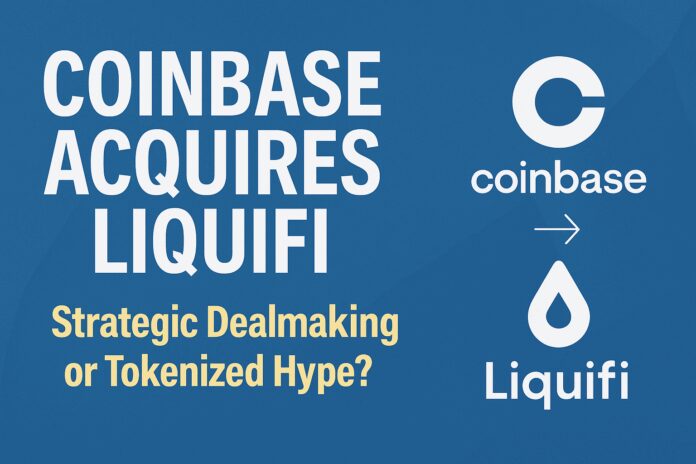With its first acquisition of 2025, Coinbase bets big on tokenized finance. But is Liquifi a missing puzzle piece or just another bet in a crowded race?
The announcement
Coinbase has announced the acquisition of Liquifi, a blockchain-based cap table and equity management startup. According to Fortune, the move marks Coinbase’s first acquisition of 2025, signaling its renewed interest in infrastructure plays amid an evolving regulatory and technological landscape.
While terms were not disclosed, the acquisition reflects Coinbase’s broader strategy to position itself as a leader in tokenization, enterprise compliance, and crypto-native corporate tooling.
Who is Liquifi?
Liquifi is a rising player in the Web3 infrastructure space, offering services that replace traditional cap table management platforms (like Carta) with smart contract–powered solutions for crypto-native organizations.
Its product suite includes:
- Tokenized cap tables for venture-backed and DAO-aligned startups
- Smart contract–based vesting schedules for employees, investors, and advisors
- On-chain governance integrations
- Compliance tooling for cross-border token issuance and wallet whitelisting
Liquifi has catered to both U.S. startups and international DAOs looking to bridge traditional corporate finance with decentralized token infrastructure.
Why Coinbase made the move
| Strategic Value | Explanation |
|---|---|
| Enterprise tokenization | The acquisition strengthens Coinbase’s bid to support equity, governance, and payroll systemson-chain. |
| B2B expansion | Liquifi adds modular APIs that can serve startups, DAOs, exchanges, and VCs. |
| Competitive moat | As tokenization matures, Coinbase gains control over more layers of the on-chain company stack. |
This acquisition aligns with Coinbase’s broader moves into custody (Coinbase Prime), identity and compliance (Travel Rule Universal Solution Technology), and infrastructure (Base L2).
What this says about the M&A trend in crypto
The deal reflects a shift in Web3 M&A toward more invisible, middleware-focused companies—infrastructure that enables real-world use cases, not just speculation.
In 2021–2022, crypto M&A revolved around flashy projects, wallets, or yield platforms.
In 2025, the trend is toward:
- Token lifecycle management
- Institutional-grade compliance tooling
- Enterprise-facing rails (e.g., payroll, equity, vesting)
In this regard, Liquifi fits the emerging narrative: a compliance-aware, API-first player with traction in an underserved corner of tokenization.
Critical questions and challenges
1. Does Liquifi scale beyond niche use cases?
Despite its promise, Liquifi is still an early-stage player. Most of its client base consists of small Web3-native startups. For Coinbase to justify the acquisition, the platform will need to scale into mid-sized SaaS, DAO treasuries, and legal token issuers.
2. Will regulators scrutinize tokenized equity?
Tokenized equity and vesting smart contracts sit at the edge of U.S. securities law. The SEC, already locked in disputes with Coinbase over staking and securities definitions, may view this acquisition as a step deeper into contested territory.
3. Integration vs. redundancy
Coinbase already offers custody, issuance, and even smart contract infrastructure via Base. Liquifi’s tech could conflict or overlap with existing teams unless managed carefully.
4. Is tokenized equity a real trend—or still theoretical?
While tokenized RWAs like treasuries and real estate are gaining traction, equity tokenization has lagged due to legal and institutional friction. If that doesn’t change, Liquifi could become a stranded asset within the Coinbase portfolio.
Bottom line
Coinbase’s acquisition of Liquifi shows that the exchange is serious about becoming the “corporate OS” of Web3. But success hinges on three critical developments:
- Clear regulatory frameworks for tokenized corporate assets
- Adoption beyond the crypto-native niche
- Flawless integration into Coinbase’s existing infrastructure
If Liquifi can serve as the backend for compliant, programmable equity in the new economy, Coinbase has just bought itself a critical long-term advantage.
If not, the deal may go the way of other infrastructure acquisitions: promising in vision, but underutilized in practice.




